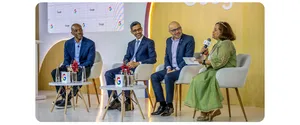3 ways this Google.org grantee is helping the Asian American community
Editor’s note: Today’s post is authored by John C. Yang, President and Executive Director of Asian Americans Advancing Justice | AAJC.
At Asian Americans Advancing Justice | AAJC (Advancing Justice | AAJC), we strive to advance the civil and human rights of Asian Americans — the fastest-growing racial group in the United States — and build and promote a fair and equitable society for all.
Over the last few years, as a Google.org grantee, we’ve continued our work to address the rise in anti-Asian hate, combat mis- and disinformation and improve digital skills within Asian American and Pacific Islander (AAPI) communities.
Here are three key ways we're working to support AAPI communities, with help from Google.
1. Advancing digital literacy
Through grants from Google.org, we’re helping other organizations host digital literacy classes. The National Asian Pacific Center on Aging (NAPCA), for example, hosted a class for older members of AAPI communities. According to recent research we’ve conducted, nearly two thirds of Asian Americans are immigrants and more than half of that population has limited English proficiency. So for greater accessibility and support, NAPCA’s classes were taught in Chinese, the students’ native language.
We selected four other organizations to pilot digital literacy classes: the Arab American Association of New York, the Asian Counseling and Referral Service, the Asian & Pacific Islander American Vote Michigan and Boat People SOS - Houston. Like NAPCA, they’ve developed successful programs specifically designed to meet their community’s needs.
The first graduating class of NAPCA’s digital skills program

2. Hosting conversations
In 2021, when hate incidents against AAPIs increased dramatically nationwide, Advancing Justice | AAJC co-hosted a webinar with Google to discuss the importance of centering AAPI narratives on creative platforms. U.S. representatives Grace Meng and Andy Kim, and YouTube creator and Wong Fu Productions Founder Philip Wang spoke at the event, sharing how they own their voices in the social media landscape. These ongoing conversations are an important step in understanding how to use social media and other creative platforms like YouTube to reclaim narratives and build lasting movements.
3. Making resources accessible
Having a strong online presence is key for advocacy nonprofits like ours. We’ve been part of the Google Ad Grants program for two years now, and have received more than $140,000 in Google Search ads to promote our mission and activities and reach the communities we serve.
We’ll continue our work to move conversations forward and find solutions that ensure Asian Americans have the resources and support they need.







